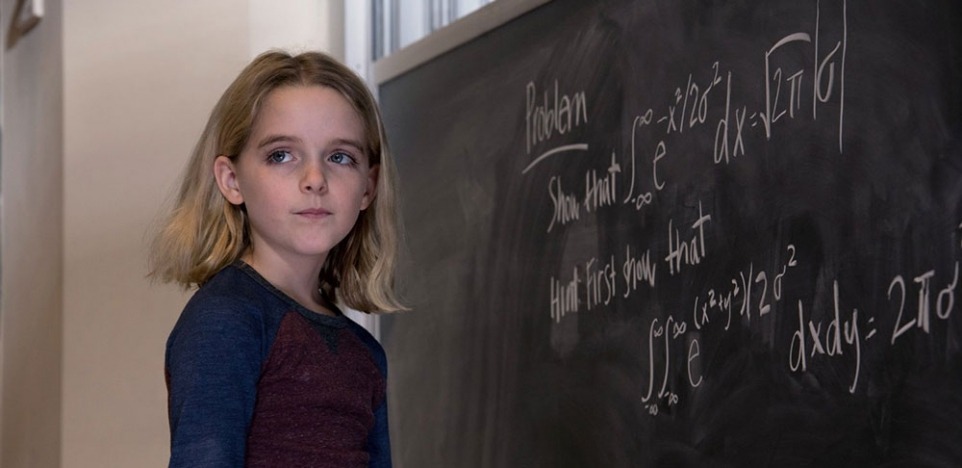Swapna Narayanan
Often some situations in life push us towards taking up some responsibilities that we never envisioned we could take. Whether it is politics, our profession or our lives – we often find ourselves in some unexpected circumstances expected to take charge of something we may not have enough experience in.
Today, let me tell you about a reel man – Frank Adler – who was caught in a similar situation.
Frank is the protagonist of the 2017 Hollywood movie – The Gifted and is played by Chris Evans, who is forced by circumstances to bring up his niece Mary, played by Mckenna Grace.

Frank is single and Mary a child prodigy in Mathematics.
Driven by a clear goal that he did not want Mary to fall into the expectations trap of his mother – Evelyn Alder, played by Lindsay Duncan – he brings Mary up single handed. He did not want his mother to manipulate Mary as she manipulated Mary’s mother – Diane Alder (his sister). So, he steers clear of Evelyn and gives up his job as professor of Philosophy in Boston University and moves to a small town in Florida.
Here he takes up life as a boat repair man and brings up his niece in a very carefree environment. While being aware of Mary’s unique mathematical abilities, he hopes she will have a normal life unlike Diane – who was surrounded by only pressure and expectations for being a highly gifted mathematician.
However, after Mary turns 7, Frank realises that he also needs to provide her with a normal childhood and equip her with some social skills that she completely lacked. Her current life is centered around him and his landlady – Roberta, played by Octavia Spencer – whom she adores. After some thinking he enrolls Mary in the local school, much against the advice of Octavia who feels that Mary’s skills will be out in the open and soon word will spread that Mary is a gifted, mathematical child prodigy.

Mary starts school and struggles to find her feet and soon her teacher – Bonnie Stevenson, played by Jenny Slate – discovers that Mary is a gifted child and needed a better environment to bring to the fore her mathematical genius. Eventually Frank’s mother Evelyn finds out about them and ends up landing at his house with plans for her grand daughter that threaten to separate him from Mary.
Just as all mothers go through this deep dilemma of – am I doing it right? am I bringing up my child correctly? am I missing out on something that is crucial for the child’s upbringing by my ignorance? etc., so does Frank. He is constantly plagued by thoughts like – what do I know about parenting? what am I doing? am I ruining her future by insisting on bringing her up?
Limited by his circumstances and his own self-doubts, along with the pressure from his formidable mother and those around him, he eventually ends up in court and gives in to put Mary into foster care.
And that unravels a story of the deep friction between Frank and his mother, Evelyn. Evelyn’s disappointment with her dead daughter’s weakness in completing the Millennium Prize Problem – Navier-Stokes problem (this is a real problem and is one of the seven Millennium Prize problems in mathematics. Clay Mathematics Institute offered a USD 1,000,000 prize to the first person providing a solution for a specific statement of the problem). Evelyn is disappointed in Frank for having quit his academic career, and resentful of her late husband for disrupting her successful career.

Frank never openly accuses Evelyn but does know that he does not want the upper class raising for Mary and that Evelyn will eventually deny Mary the normalcy a child needs in her life.
The movie showcases Frank’s deep love for Mary and his deeper instinct to ensure Mary gets a childhood filled with love, happiness and freedom – feelings which we often think only mothers possess for their children.
There is one scene that stays in my heart – during one of heated conversations Frank hurts Mary by saying that he gave up his own life since Mary entered his life. And on realising that he has deeply pained Mary’s heart, he takes her to a maternity ward in a hospital. They see a family waiting for a baby to be born, and after a long wait they witness the entire scenario of the baby being born, the announcing, and the family’s jubilant reactions filled with hugs, happy tears, prayers and an environment of love and happiness. As Mary sees and soaks all this in Frank tells her, “It was exactly like that when you were born.” She then asks who delivered the good news about her arrival, and he says, “I did.”

Self-doubt and second thoughts are part of every parents life, but the love for the child always surpasses and one eventually ends up bringing the child up in the right way.
And the children always sense this deep love in their parents and that keeps them grounded, rooted and secured.
As Mary says of Frank, “He’s a good person, I think. He loved me before I was smart.”
Eventually, as a father figure, Frank finds a balanced world for Mary where she is able to hone her mathematical skills at the university while having a happy time at the local school with kids her age.
*All images used in this article are either Eyra’s own design or widely and freely available on the internet.*

